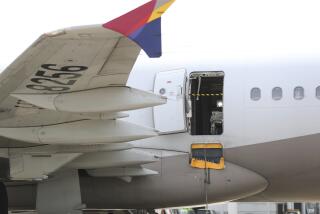NEWS ANALYSIS : NATO May Be Preserved--but in What Role?
- Share via
LONDON — Efforts here to forge a historic agreement transforming NATO are part of a major attempt to carve out a new role for the 41-year-old alliance in a Europe emerging from the Cold War but still haunted by its long history of conflict.
The need to preserve a predominantly military alliance at all may have been called into question at a time when peace and reconciliation dominate events on the once-divided Continent.
But despite the extent of change over the past year, a majority of alliance members meeting at the summit here are convinced that NATO must be preserved to ensure against a return of crisis. The alliance must continue to carry out its three-fold mission summed up by a quip: “Keep the Americans in, the Soviets out and the Germans down.”
“We’re at the end of one period of contemporary history, the post-World War II era,” commented a respected Western ambassador. “But the problem is (that) a new period has yet to emerge. We are in a transition full of uncertainty, full of promise and full of danger.
“We must manage this transition around certain institutions and NATO is one of them,” the diplomat added.
Indeed, it is one of the ironies of the new, more relaxed mood in Europe that the once-vocal chorus of, “Yankee, go home” that droned as a backdrop to the Cold War era has become strangely silent.
With the hope of a new peace, policy-makers in virtually every Western country have become preoccupied with what they see as the need to keep the Americans engaged on the Continent.
In part, this is because of the realization that despite the new spirit, only the Americans have the military strength to counterbalance even a more benign Soviet Union.
But it is also linked with history and the conviction among many Europeans that the American departure from Europe after World War I was a significant contributing factor to the events that led to World War II.
“Of all the European relationships the United States has, NATO is the most important,” commented Hans Binnendyck, a security expert at the International Institute of Strategic Studies here.
From Washington’s standpoint, the North Atlantic Treaty Organization is also by far the most desirable European institution because it is the one that the United States has long dominated. The Bush Administration has made the alliance the centerpiece of its own Europe-centered agenda.
If NATO should fade away, the U.S. role in Europe would shrink, no matter how much U.S. policy-makers might wish otherwise.
“We like an organization in which we are preeminent,” said Gregory Treverton, a senior fellow of the Council on Foreign Relations in New York. “We are pretty good at managing institutions that we dominate. The question is whether we will be as good at participating in institutions that we don’t dominate.”
Although the other 15 member nations are jealous of their autonomy within the alliance, the NATO summit used a draft submitted by President Bush as the starting point for the declaration of the alliance’s future, which will be issued today at the conclusion of the meeting.
The need to keep the Germans down is a more delicate problem, rarely expressed openly within the alliance, but nevertheless deeply felt.
Germany’s neighbors believe NATO membership is essential to prevent any independent German military command from emerging and possibly moving on its own.
The extent of this concern was easily measured by the near-universal rejection of Moscow’s initial proposal for a neutral, united Germany by members of NATO and the Warsaw Pact.
Even within Germany itself, there is a strong body of opinion that NATO membership is a safer option.
Perhaps the most perplexing issue facing post-Cold War Europe is how to deal with a changing Soviet Union.
Four decades ago, when NATO was established to deter Soviet dictator Josef Stalin, the task was dangerous and difficult but the objective was clear and simple. The alliance sought to deploy such a formidable military machine--armed with a deadly array of nuclear weapons--that the Soviets would not dare attack.
Today, when the Soviet Union seems far less menacing, deterrence is surely less dangerous. The alliance remains unified in its objective of preventing a resurgence of the Soviet threat, but it faces some disagreement about how to do it.
Bush and West German Chancellor Helmut Kohl advocate a strategy intended to keep President Mikhail S. Gorbachev and his policy of perestroika in power in Moscow. Bush and Kohl have made it clear that, in their view, the best way to keep Soviet tanks out of Western Europe is to offer Gorbachev a way to take part in the Continent’s political life.
Bush called on NATO to invite Gorbachev to attend a meeting of the alliance. And he proposed a largely semantic change in NATO’s nuclear doctrine to emphasize that atomic weapons would be used only as a “last resort.”
For his part, Kohl said West Germany is willing to negotiate a ceiling on the armed forces maintained by Germany following the reunification of the Bonn regime with the formerly Communist East Germany.
Both Bush and Kohl clearly hope to strengthen Gorbachev’s hand against hard-line forces in Moscow.
But British Prime Minister Margaret Thatcher and French President Francois Mitterrand cautioned that the alliance cannot let down its military guard.
Thatcher argued that even Gorbachev’s seemingly benign Soviet Union is producing far more weapons of mass destruction than is the United States.
“We need to keep the resolve to defend ourselves,” she said, noting the present instability within the Soviet Union.
More to Read
Sign up for Essential California
The most important California stories and recommendations in your inbox every morning.
You may occasionally receive promotional content from the Los Angeles Times.







